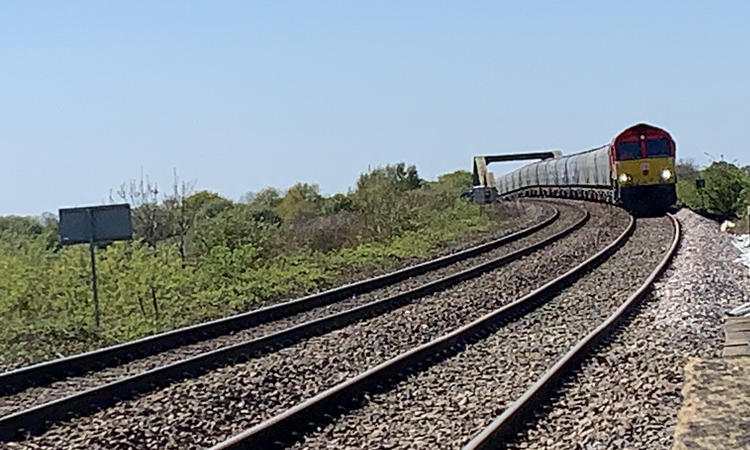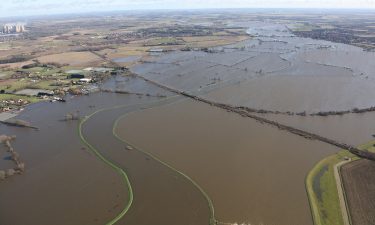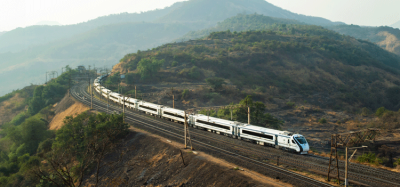Work to reopen key UK freight line completed by Network Rail
Posted: 21 April 2020 | Global Railway Review | No comments yet
After one of two rail lines leading into Drax Power Station, Yorkshire, was flooded, Network Rail worked to keep vital freight moving and keep the UK powered during the COVID-19 crisis.


Network Rail has announced that it has reopened one of the most important freight lines in the UK after an unprecedented 24/7 operation to continue freight movement and keep the country powered during the COVID-19 pandemic.


Credit: Network Rail – Flooding near Drax Power Station, Selby, Yorkshire
One of two lines leading in and out of Drax Power Station in Selby, Yorkshire, had to close in February 2020 when water from the nearby River Aire flooded the area. But engineers were able to keep one route open to allow vital freight services transporting sustainable biomass to keep the nation powered up during the COVID-19 pandemic.
With the Selby plant supplying five per cent of the UK’s electricity, it was vital to keep services moving while repair work was carried out. Engineers were deployed on 24-hour-a-day shifts to maintain the constant safety reassurance required to keep the necessary freight trains running.
The damaged line has now been reopened following significant repair work by Network Rail. Deliveries were maintained while the work took place, with over 90 freight trains per week transporting sustainable biomass to the plant. This was made possible by the rail industry working together and the dedication of Network Rail – and their contractors, CML – who took up shifts to keep watch of the site and make sure that trains could use the line safely. A crucial job was monitoring the railway embankment for any further movement following the damage caused by floods.
Head of Operations for Network Rail’s North and East Route, Chris Gee, said: “This was an unprecedented operation to deal with an unprecedented situation. It’s never been more important for us to keep freight services running, so we pulled out all the stops to maintain this vital link while we conducted repair work at the same time.”
Chris added: “Our teams have worked non-stop to make sure that crucial deliveries of biomass have been able to run despite severe flooding, which has been incredibly important to keep the nation powered up. This has been a real team effort and shows the dedication of the rail industry to keep vital services moving during this national crisis.”
The emergency repair work cost £300,000 and included unconventional methods to make sure that the line could reopen as quickly as possible. This included using a team of divers to inspect structures which were underwater to check for damage, as well as flying drones and helicopters along the route to assess the extent of the damage.
Significant repair work to the track needed to take place before it could reopen, such as replacing the ballast and stones, which support the track, after sections of it were washed away by flood water.
Keeping freight services moving is of vital importance during the COVID-19 crisis, with the transportation of sustainable biomass helping to keep the country powered. Network Rail is working on ways to improve resilience on the line, with a £2.5 million investment, and are currently in the design stage of this project.
The UK Rail Minister, Chris Heaton-Harris, said: “Freight plays a vital role in ensuring critical food and supplies can continue moving smoothly at this challenging time. It is fantastic news that this important line has reopened and, once again, I want to thank frontline staff for their efforts.”
Will Gardiner, CEO of Drax, said: “The teams who worked tirelessly at Network Rail, on the UK rail freight system and at Drax to ensure deliveries of sustainable biomass were maintained throughout the repair work, so we can continue to generate the power the country needs during the COVID-19 crisis, have done a tremendous job.”
Will continued: “These rail deliveries are a critical part of our global supply chain for sustainable biomass that supports thousands of jobs and has delivered economic growth across the north of England, while supplying renewable electricity to millions of homes and businesses.”
Related topics
Cargo, Freight & Heavy-Haul, Coronavirus/COVID-19, Infrastructure Developments, The Workforce, Track/Infrastructure Maintenance & Engineering







